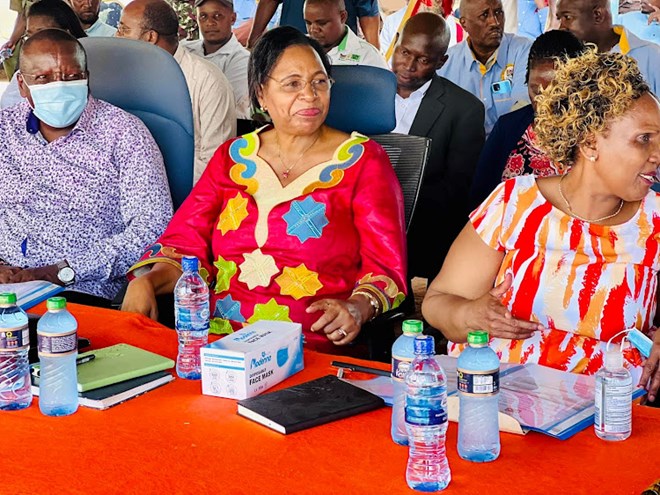
by STEPHEN ASTARIKO Correspondent, North Eastern
Monday May 23, 2022

Three Garissa MPs now want the national government and
donors funding the Kenya Development Response to Displacement Impacts Project,
to extend the programme by five years.
Led by Dadaab MP Mohamed Dahiye, Abdikarim Osman (Fafi) and
Mohamed Hire (Lagdera), they said the project had positively impacted more than
1,200 community groups in the area.
KDRDIP is a national government initiative, supported by the
World Bank.
It is meant to improve the livelihoods of the communities in
Dadaab refugee camps in Fafi, Lagdera, Dadaab and Kakuma in Garissa and
Turkana, who have been hosting refugees for the past 30 years.
The five-year project launched in 2017, is part of the
regional initiative in the Horn of Africa being implemented in Djibouti,
Ethiopia, Kenya, Uganda and Somalia.
Dahiye said that NGOs among them the Rural Development
Organization who are the KDRDIP facilitating partners should be given roles in
the day-to-day running of the project during the second phase.
“The RDO has done an excellent job in mobilising and
assisting the community groups in identifying, prioritising and implementing their
projects,” Dahiye said.
Hire said KDRDIP has supplemented the CDF projects and
positively impacted community livelihood programmes in the three
constituencies.
“I am urging you the CS to engage the World Bank and other
donors to secure a phase II of this project. We want local NGOs who have been
assisting KDRDIP to be brought on board,” Hire said.
MP Abdikarim Osman said they will use all available channels
to ensure another five-year phase of the programme is secured.
The MPs spoke in Dadaab on Saturday.
They had accompanied Public Service CS Margaret Kobia in
commissioning the theatre equipment at the Dadaab Subcounty Hospital and
opening a modern library and dormitory at Dadaab High School.
Kobia promised to address the leaders and community concerns
among them the extension of the project.
She thanked the leaders for their continued support,
participation and involvement in the project implementation process.
“KDRDIP approach presented opportunities and best practices
in community development and governance which perhaps need to be considered
when doing national development policies,” Kobia said.
“This project has enjoyed political goodwill, community
participation and involvement in its implementation process.”
She said the project has revealed that communities can
identify their own development needs, monitor, supervise and participate fully
in the decision making on their development initiatives.
The project is utilising funds sourced from the World Bank
loan of Sh10 billion and additional funding from the Danish International
Development Association Sh800 million.
These funds have been distributed to 137 villages across 29
wards of the five subcounties; Dadaab, Fafi, Lagdera, Turkana West and Wajir
South in the three project counties.
At the end of the project, Garissa will have Sh4 billion,
Turkana Sh3 billion and Wajir Sh3 billion.
The project is benefitting a combined population of
1,041,436 members of the host communities and 395,982 refugees in the five
subcounties.
So far Sh7.4 billion has been spent in the last three years
to improve infrastructural development, environment and livelihoods in the
targeted areas.
Another Sh2.6 billion has been earmarked in the 2022/23
financial year to complete the outstanding sub-projects.
Present at the event was Micah Powon ASALs PS, Anne Kinyua
KDRDIP national project coordinator, NDMA chief executive officer Rtd Lt
Colonel Haret Hassan and Garissa county commissioner Boaz Cherutich.
Edited by Kiilu
Damaris